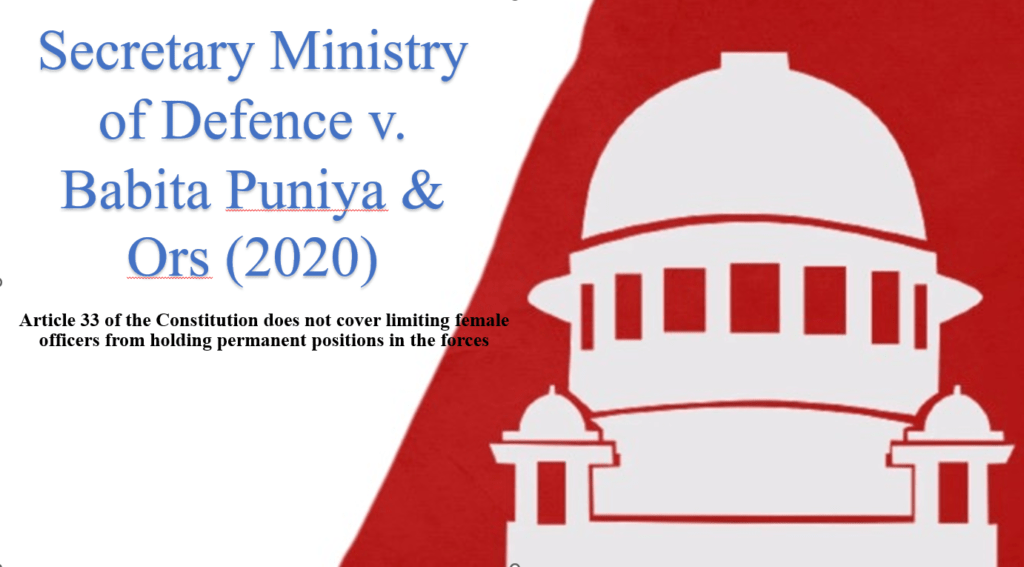
Introduction
The quest for gender equality in India has been an uphill battle even before its independence. Even today there are many spheres in life where the society and the government has failed to provide Indian women with equal opportunities as opposed to men. Ours being a patriarchal society has proven to be a setback for women and even third genders in workplaces. Who in turn have faced years of discrimination and pushed into boxes of stereotypes thus, impeding their true potential and freedom to choose a profession and engage in work. The Hon’ble Supreme Court of India has been the only saving grace when it comes to ensuring women’s rights and gender equality as it is the strongest force still committed towards the issue while the organs of our system have largely been a silent spectator, watching from the side lines. But this inaction and the age-old mindset is not the way to go today when the whole world is taking massive strides in uplifting women. And it is not only about competing with the ever-changing world but also to safeguard the Constitutional values of our country which are the pillars of our democracy.
One such landmark win in the favour of this movement has been the judgment of The Secretary, Ministry of Defence v. Babita Puniya & Ors. In this case the Supreme Court issued the order to provide women officers in 10 non-combat service units permanent commission and held them eligible to hold command posts. This judgment has come at the heels of many such provisions in other countries like Israel where women have been allowed entry into combat roles since 1995 and Norway did so even before that in 1985 followed by Canada in 1989 and Germany in 2001. Australia and the UK too have opened all positions in the defence forces since 2013 and 2016 respectively. Some other examples are France, Netherlands, and North Korea where women are present at the front line. Even Pakistan has succeeded in inducting its first fighter pilot in 2013. This ruling has not only managed to debunk several myths regarding the physical and mental capabilities of women but also played a huge part in safeguarding the constitutional rights which are the heart of our Constitution.
Facts of the case
The first official insight into permanent commission for women officers was in the year 1992 when the Supreme Court released a notification making women officers eligible for positions in the short service commissions (SSC) in the Artillery Regiment and corps of intelligence, signals, Judge Advocate General’s department, Army Education Corps, Army postal Service, etc. prior to this the roles of women were only limited to the areas of Medical assistance. These positions were only available to women for a short span of time as according to the provision in Section 12 of the Army Act of 1950 which states that-
‘No female shall be eligible for enrolment or employment in the regular Army, except in such corps, department, branch or other body forming part of, or attached to any portion of, the regular Army as the Central Government may, by notification in the Official Gazette, specify in this behalf.’
To counter this a writ petition was filed before the Delhi High Court by Babita Puniya who is a practicing advocate, in the February of 2003. Seeking parity for women with their male counterparts who too were selected through SSC examinations. After this many other female officers from both the Army and the Air force appeared before the court seeking the same relief. Their appeals were all clubbed. Later in 2005 the Ministry of defence extended the validity of the scheme and in 2006 the period of service was increased from five years to a maximum of 14 years. Then in October of the same year Major Leena Gaurav moved the court challenging the provisions of the notifications issued recently and to also push for permanent commission. A similar appeal was also filed by Lt. Seema Singh the next year.
On September 26, 2008, the Ministry of defence issued another circular finally granting prospective permanent commission to SSC women officers in Judge Advocate general’s department and the Army Education Corps. This was further challenged by Major Sandhya Yadav before the Delhi High Court citing the reason that it had only granted permanent commission only prospectively and only to officers from certain cadres.
Procedural History
In 2010 the High Court consolidated the petitions together and directed the centre and the Ministry of defence to grant permanent commission to the woman officers from the Army and the Air Force who seek this but have not been granted it yet. In a reaction to this the appellants moved the Supreme Court and even Contempt proceedings were filed against the centre for non-compliance with the high court orders. This compelled the solicitor general to issue a statement for Permanent commission for women because of it was decided to stay the contempt proceedings.
To further the order the Central government decided to form a committee in 2011 and the Supreme Court complied by adjourning the issue by six weeks. The appeal for the present case was filed in September of the year but it remained pending till the current judgment.
The Army challenged the Delhi high court’s order in the Supreme Court, but the court maintained its position and directed the implementation of its order. in 2018 the Prime Minister communicated the centre’s deliberation in granting permanent commission to woman officers.
Finally in 2019 the government issued guidelines for recruitment of women officers to permanent positions but the conditions were that the grant was prospective and only newly commissioned officers could be elevated to permanent positions, keeping serving ones out of its ambit. The permanent commission was available for new officers in eight combat roles.
Issues
The main issues raised in the Supreme Court were:
- Whether women should be granted permanent positions in the defence forces?
- Should be the guidelines issued by the government on 15 February be implemented?
- What conditions govern the woman officers in the Army currently?
Judgment
The judgment of the Supreme Court, pronounced by the Justice Chandrachud, stated this issue is a violation of the Article 14 of the Constitution, which is a fundamental right of the woman officers, and that Article 33 of the Constitution does not cover limiting female officers from holding permanent positions in the forces and is only applicable for enforcing the discipline and performance of the officers. The following conditions were enlisted by the Court in the furtherance of the judgment:
- There is not restriction on female officers being granted permanent commission based on their tenure, whether it is 14 or 20 years. All officers including the newly inducted and the currently serving ones are to be considered without any preference given to one.
- As a result, the Delhi High Court’s order stands valid.
- There is no contrariety in the options granted to male officers when opting for permanent commission as compared to female officers. The terms and conditions too remain the same.
- Some specified expressions like ‘in various staff appointments’ and ‘staff appointments only’ are not to be implemented when granting permanent commission to woman officers.
- The woman officers should have the option to continue the service until they are eligible to receive pension and the all the other available incentives enjoyed by the male officers.
Conclusion
This judgement is an important win for women’s rights and the gender equality movement and is also one in the bag for upholding the integrity of the Indian Constitution. Especially the fundamental rights whose violation in this case has been going on for too long. The Supreme Court not only successfully ensured that gender justice prevails but also trashed the obscenely misogynistic and backward take of the Army on women’s roles in the society and the home. The discriminatory provision in the army act and the strong resistance from the male Army heads has brought into light that even moralistic institutions like the Army have a lot to learn and unlearn and catch up with the times. The views about women being the weaker sex or too emotional do not fall in line with the real-world scenario today where the once gender roles which were seemed to be set in stone are now changing rapidly and individuals are no longer feeling pressured by societal expectations to conform to them. Removing this blanket ban will now help women reach a higher potential, take on positions of power in a world that has been dominated by men for years and be on equal terms with their male compeers in terms of the privileges that they enjoy.
written by-Atiya Shahab intern under legal vidhiya





0 Comments